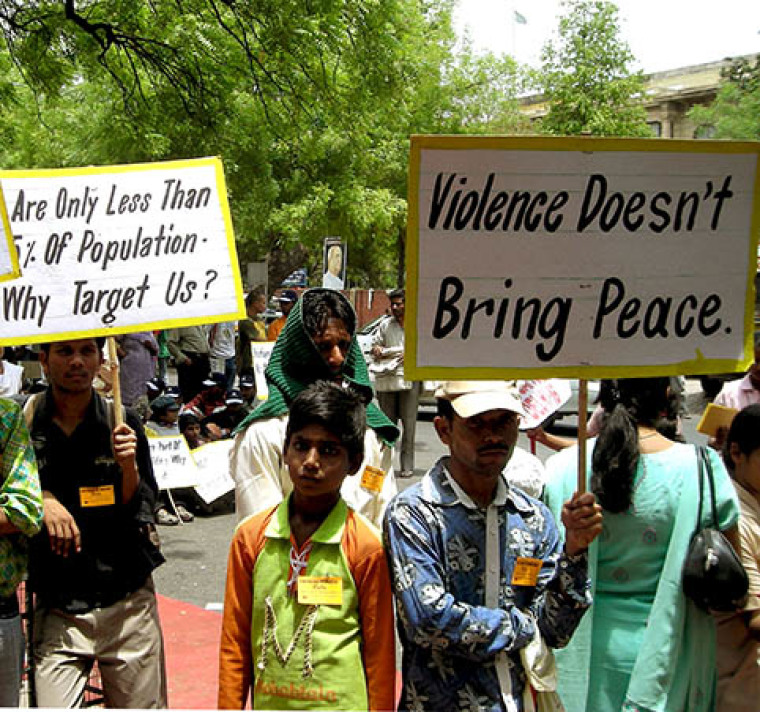
Police arrested the Catholic, retired Indian Army Cpl. Henry Baptist Robey, and two guests from Tamil Nadu state, Ram Moorthy and another identified only as Mani, from Robey's house on Hennur-Bellary Road in the state capital of Bangalore while they and others were celebrating Pentecost on Sunday (June 12).
"I was arrested under Section 295(A) of the Indian Penal Code after a few men lodged a complaint that I was converting leprosy patients," Robey told Compass by phone.
Violation of Section 295(A), "deliberate and malicious intention of outraging the religious feelings" of others, is punishable with imprisonment of up to three years and/or a fine.
Robey said about 80 leprosy patients from neighboring Tamil Nadu state came to his house after he invited them to a special Pentecost prayer service.
"All the leprosy patients who had come for the prayer function told the police that they were Hindu, and that they were not being converted, but the police still registered a complaint against us," Robey said. "Police should have arrested the complainants, who forcibly came into my house and searched every room and beat some of the leprosy patients as the police looked on."
Circle Inspector Hanumantharayappa acknowledged to Compass that two of the accused were Hindus.
"They brought others from Tamil Nadu state to Bangalore not just for food [but to be converted]," the inspector said. "They [the two Hindus] were paid for that, that's what the complainants said."
He denied that the two arrested visitors were leprosy patients.
Asked why the leprosy patients said they were not being converted and that they had come voluntarily – and asked who were the real victims in the case – the official said he would share "each and every detail" after a preliminary investigation.
Dr. Sajan K. George of the Karnataka-based Global Council of Indian Christians, who reported the incident, said he had petitioned the National Human Rights Commission against the filing of charges against Robey.
"The tragedy of the whole thing is that, though the very leprosy patients repeatedly told the police that they visit and receive their gifts every year and that there are no conversions as had been alleged, the police did not pay any heed," George said. "Perhaps in the days to come, giving alms from the window of your house will be construed as an attempt to convert if you are a Christian and the receiver a Hindu leprosy patient."
Some of the visitors from Tamil Nadu were sitting on the veranda as they ate lunch, Robey said.
"I was told by some of them that cameramen had come from the media to take pictures," Robey said. "I didn't pay much attention. But then I heard some noise and found out that a crowd of men had gathered around my house. They alleged I had brought the leprosy patients for conversion. I explained I am just interested in taking care of them as fellow human beings and not interested in their conversion. But they were not willing to listen."
The crowd soon swelled to over 100. While Robey could not say with certainty who the men were, some local residents later told him that they belonged to the Hindu extremist Jai Karnataka group, said to have close ties with the ruling Hindu nationalist Bharatiya Janata Party (BJP).
Police soon arrived and took Robey and all his guests to the police post. All were released two hours later except Robey and the two Hindu lepers. That night they were taken to the Hennur police station and officially arrested.
On the morning of June 13, police took them to court, and they were sent in judicial custody to Bangalore Central Jail. Their plea for bail was initially rejected, but the next day they were granted bail.
Leprosy patients, believed to be religiously impure and physically contagious – though the disease is hardly infectious after treatment – live in isolated hamlets in India. Robey has been going to a village in Tamil Nadu state twice a year to provide them clothing, medicines, and ration.
"Some of them said they really wanted to come for the prayer, and I invited them," he said. "What's wrong with that?"
He said he was charged with a victimless crime.
Karnataka recorded the highest number of anti-Christian attacks among all Indian states in 2009 and 2010. Of the at least 149 anti-Christian incidents recorded nationally in 2010, 56 were from Karnataka, according to the Evangelical Fellowship of India. In 2009, Karnataka witnessed at least 48 attacks. The year 2008 was even worse, with at least 28 attacks reported in less than two months in August and September.
Attacks on Christians increased in the state after the BJP came to sole power in May 2008. Prior to that, it ruled in alliance with a local party for 20 months.
Christians complain that the state government is not only doing little to protect them but also supporting the attackers, mostly extremist Hindu nationalists. A government panel in February blamed anti-Christian violence on conversions, rubbing salt into their wound (see www.compassdirect.org, "Report in India Blames Attacks on Conversions to Christianity," Feb. 8).
For more information, visit www.compassdirect.org